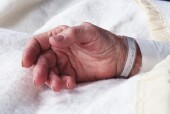 |
 |
 |
||
    |
||||
|
||||

Critically Ill Patients Lack Vitamin D
Almost half of those in ICU had deficient levels, study shows|
|
HealthDay
Wednesday, April 29, 2009
 WEDNESDAY, April 29 (HealthDay News) -- Vitamin D levels are deficient in many critically ill patients, new research shows.
WEDNESDAY, April 29 (HealthDay News) -- Vitamin D levels are deficient in many critically ill patients, new research shows.
In a small study, Australian researchers found that almost half of people in an intensive care unit were deficient in vitamin D.
"Vitamin D deficiency is likely to be common in seriously ill patients," said study author Dr. Paul Lee, an endocrinologist and research fellow at the Garvan Institute of Medical Research in Sydney, Australia. "In our study, 45 percent of critically ill patients were vitamin D-deficient. It appears that the sicker they were, the lower their vitamin D. However, it is uncertain whether it is just an association, or whether vitamin D deficiency itself contributes to disease severity."
Results of the study were published as a letter in the April 30 issue of the New England Journal of Medicine.
Vitamin D is a fat-soluble vitamin that the body manufactures after exposure to sunlight, according to the U.S. government's Office of Dietary Supplements (ODS). Few foods naturally contain vitamin D. Those that do include fatty fish, such as salmon and tuna, cheese, egg yolks and some mushrooms. Vitamin D is also found in fortified milk and cereals.
The recommended daily intake of vitamin D is 200 international units (IU) for adults under 50; 400 IUs for adults between 51 and 70, and 600 IUs for those 71 and older, according to the ODS. However, some experts believe these recommendations are too low, as vitamin D deficiency is increasingly being linked to adverse health outcomes.
Lee said that vitamin D is involved in controlling blood sugar levels, calcium levels, heart function, gastrointestinal health, defending against infection and more.
In the latest study, the researchers measured vitamin D levels in 42 people being treated in an intensive care unit. Almost half were vitamin D-deficient.
Three patients died during the study, and the researchers found that they had the lowest levels of vitamin D in the study group.
Lee said the researchers don't know the exact cause of the vitamin D deficiency. A lack of sun exposure could play a role, as could a lack of dietary intake of vitamin D. But, Lee said, "it may be postulated that the tissue demand for vitamin D is increased during infection, metabolic disturbances and inflammation. Vitamin D may therefore be used up during critical illness. However, it is a hypothesis, and the relationship between vitamin D and critical illness requires further studies in the future."
Dr. David Weinstein, a nephrologist at Beaumont Hospital in Royal Oak, Mich., agreed that more research needs to be done to tease out what the cause of the vitamin D deficiency is, and studies need to be done to see if replacing the lost vitamin D would benefit these patients.
"We know that in stable situations, vitamin D deficiency definitely has a potential link to mortality, and vitamin D replacement does improve outcomes," said Weinstein. But, he added, "from this study, it's too early to tell if there would be a mortality benefit from vitamin D replacement." And for immobile patients, there's a risk of creating calcium levels that are too high, he added.
In the current study, 10 patients were given vitamin D supplements, and no protective effect was found.
Dr. Kirit Tolia, chief of endocrinology at Providence Hospital in Southfield, Mich., said his sense is that replacing vitamin D in such critically ill patients may be too late. "If you go into illness with a significant vitamin D deficiency, it makes whatever the underlying cause of the hospitalization worse," he said. For example, if someone is being treated for sepsis -- a serious infection -- if their vitamin D levels are low, it makes it harder for them to fight the infection, he explained.
Tolia added that he wasn't surprised by the findings, because he sees a lot of vitamin D deficiency, but that he was "alarmed at the severity of the deficiency and the prevalence of it."
Additionally, he said he believes that healthy adults should get about 1,000 IUs of vitamin D daily, and that those who are elderly or in poor health should get about 1,500 IUs daily. "That gives them a fair chance of maintaining vitamin D in the normal range," he said.
HealthDay
Copyright (c) 2009 ScoutNews, LLC. All rights reserved.
Related News:
More News on this Date
Related MedlinePlus Pages:
| Home | Health Topics | Drugs & Supplements | Encyclopedia | Dictionary | News | Directories | Other Resources | |
| Disclaimers | Copyright | Privacy | Accessibility | Quality Guidelines U.S. National Library of Medicine, 8600 Rockville Pike, Bethesda, MD 20894 National Institutes of Health | Department of Health & Human Services |
Date last updated: 30 April 2009 |
